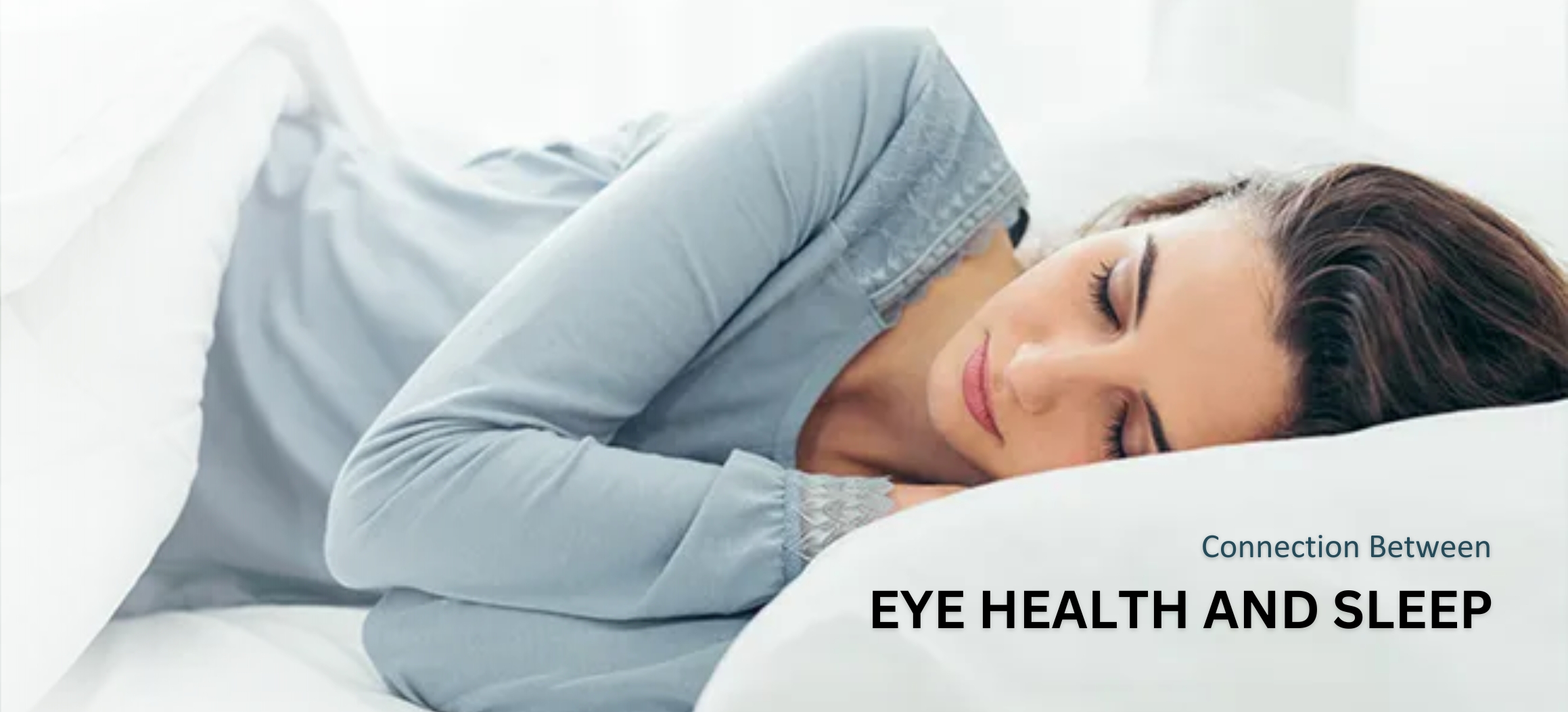
Sleep plays a vital role in maintaining overall health, but its importance for eye health is often overlooked. The connection between sleep and eye health is profound, as poor sleep habits can significantly affect the eyes, leading to various complications such as dryness, irritation, and even more serious issues over time. Understanding how rest impacts vision is essential for preserving eye health, especially in today’s fast-paced world, where many struggle with sleep deprivation.
How Sleep Impacts Your Overall Health?
Sleep is one of the most critical components of a healthy lifestyle. It allows the body to restore and repair itself, impacting everything from cognitive function to immune strength. During sleep, the brain clears out toxins, regulates hormones, and processes memories, while the body repairs tissues and strengthens muscles. Without adequate rest, this recovery process is hindered, leading to numerous physical and mental health problems. For the eyes specifically, sleep is crucial in maintaining hydration and reducing inflammation. Proper sleep helps the tear film, a crucial layer that keeps your eyes lubricated, function effectively. When you experience sleep deprivation, the eyes can become dry, irritated, and more prone to infections. Bloodshot eyes from sleep deprivation are one of the most common signs that something is off balance.
The Science Behind Sleep and Eye Function
Scientifically, sleep is vital for replenishing essential eye functions, such as oxygenation. When the eyes are closed, they receive crucial nutrients and oxygen, which are necessary for maintaining healthy corneal tissue. Inadequate sleep can impair these processes, leading to discomfort like itchy eyes and difficulty focusing. Sleep deprivation and eye health are intertwined because the optic nerve and muscles controlling eye movement depend on sleep for proper functioning. Without sufficient rest, symptoms like watery eyes, blurred vision, and even long-term damage, such as increased susceptibility to allergic conjunctivitis, can arise, making sleep essential for eye care.
Why Lack of Sleep Can Harm Your Eyes?
Lack of sleep harms eye health in multiple ways. One of the most immediate effects is the appearance of bloodshot eyes and dry, itchy eyes due to insufficient hydration and oxygenation. Over time, chronic sleep deprivation exacerbates conditions like allergic conjunctivitis and even contributes to more serious problems like glaucoma. Sleep deprivation and eyes are closely linked because sleep is crucial for preventing dryness and irritation. Those suffering from ongoing lack of sleep may also experience watery eyes, blurred vision, and an increased risk of eye infections, underlining the necessity of rest for preventing eye damage and ensuring overall eye health.
The Role of Sleep in Preventing Eye Strain and Fatigue
Eye strain and fatigue are common issues linked to prolonged screen use and lack of sleep. Insufficient rest makes it harder for the eyes to focus, causing discomfort like itchy eyes and watery eyes. Over time, this leads to more significant problems, such as eye strain, which can reduce productivity and affect the quality of life. Adequate sleep is essential for preventing these issues by allowing the muscles controlling eye movements to relax and recover. Eye strain, particularly aggravated by digital devices, can cause long-term problems if not addressed. This makes the connection between sleep and eye health a critical factor in maintaining vision.
How do Sleep Disorders Affect Eye Health?
Sleep disorders, such as insomnia and sleep apnea, can significantly impact eye health. These disorders lead to fluctuating oxygen levels in the blood, which can increase the risk of developing conditions like glaucoma and optic neuropathy. Sleep deprivation in people with sleep disorders also makes the eyes more vulnerable to infections and inflammation, causing symptoms like watery eyes, swollen eyes, and dry, itchy eyes. The relationship between sleep disorders and eye health shows that proper sleep is crucial for preventing both short-term discomfort and long-term damage, particularly for those already prone to allergic reactions or other eye-related conditions.
Tips for Improving Sleep and Protecting Your Vision
Improving sleep hygiene is essential for protecting eye health and preventing conditions like itchy eyes and watery eyes. Simple changes, such as establishing a consistent sleep schedule and minimizing screen time before bed, can significantly improve sleep quality. Additionally, ensuring your sleep environment is dark, quiet, and cool helps reduce the risk of sleep disruptions. Using artificial tears can also help alleviate dry, itchy eyes caused by sleep deprivation.
The Link Between Sleep Apnea and Vision Problems
Sleep apnea has been closely linked to serious vision problems. People with sleep apnea experience oxygen deprivation during the night, which can impair blood flow to the optic nerve, leading to conditions like glaucoma. Sleep deprivation associated with sleep apnea can also cause dry, itchy eyes, watery eyes, and allergic conjunctivitis. This makes the connection between sleep and eye health critical, as addressing sleep apnea not only improves overall health but also prevents severe vision problems.
Importance of REM Sleep for Eye Health
Rapid Eye Movement (REM) sleep is an essential phase of the sleep cycle, during which most dreaming occurs. It’s also a crucial period for the eyes, as the rapid movements help keep them lubricated. REM sleep is thought to support healthy corneal function and prevent dry eye syndrome, a condition that can result from insufficient tear production. Furthermore, during REM sleep, the brain processes visual information and strengthens the neural pathways involved in vision. Disrupted or insufficient REM sleep can negatively impact both short-term eye comfort and long-term vision health, making it essential to ensure a good balance of REM sleep each night.
Best Practices for Eye Care During Sleep Deprivation
While it is best to avoid sleep deprivation altogether, there are steps to protect eye health when sleep is lacking. Using artificial tears can help alleviate symptoms like itchy eyes and watery eyes. Taking breaks throughout the day to close the eyes and rest can also provide temporary relief.
Additionally, wearing an eye mask during sleep can block out light, promoting deeper rest and reducing the chances of experiencing bloodshot or swollen eyes. Practicing good eye care routines during sleep deprivation helps reduce the impact on eye health and prevents the worsening of conditions like allergic conjunctivitis and eye strain.
FAQ
Yes, chronic sleep deprivation can lead to conditions such as glaucoma or optic neuropathy, which may result in long-term vision damage if left untreated.
REM sleep helps maintain eye lubrication and supports the neural pathways involved in vision, making it essential for overall eye health.
Common symptoms include dry eyes, irritation, difficulty focusing, bloodshot eyes, and sensitivity to light. These signs often indicate that the eyes are not getting the necessary rest, leading to discomfort and visual strain.
Yes, conditions like dry eye syndrome, bloodshot eyes, glaucoma, and optic neuropathy can be linked to poor sleep habits or disorders like sleep apnea.
Categories
Company
Media
Follow Us
© Copyright Biotech /Terms Of Use - Privacy Policy
Version 2_CT_1212222
